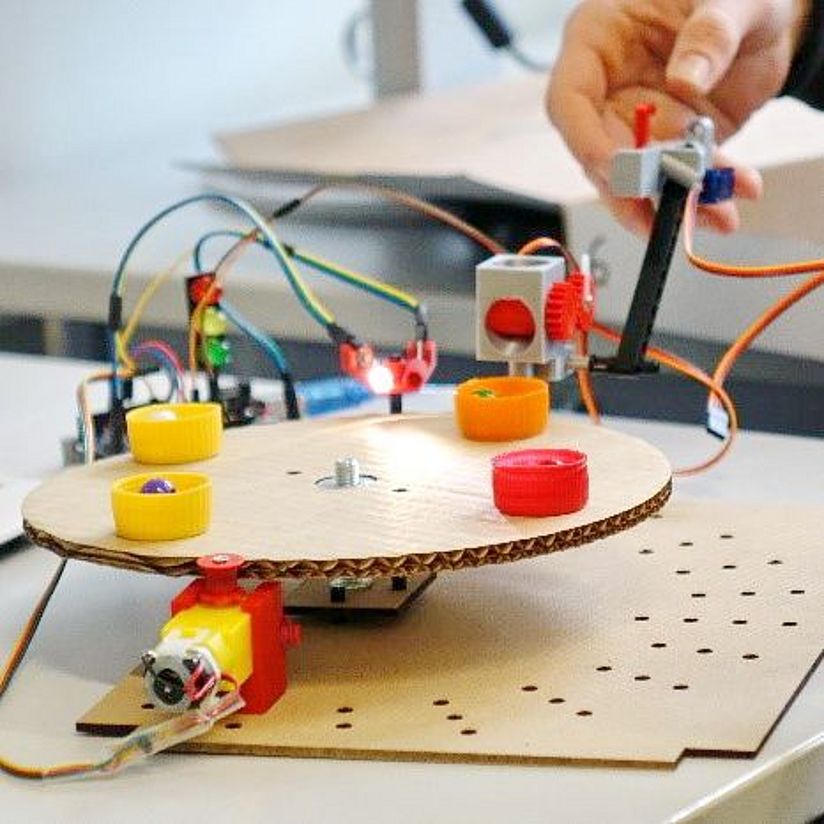
Photo: Deutsches Museum
Museological research
Erasmus+ Hands-on-Remote
In response to the multiple challenges of the COVID pandemic, the Hands-on-Remote project aims to support teachers in creating collaborative experimentation situations - independent of the current teaching format and also across spatial distances. To this end, methods for practical remote learning are being developed and implemented in three teaching modules on different topics. In addition, a handbook supports teachers in developing these formats further and in implementing them in their own teaching concepts.
Content
Erasmus+ teaching modules with hands-on experiments for flexible use in different (COVID) teaching scenarios - at home, hybrid, or on-site in the classroom
Funded by
Erasmus+ - Cooperation for innovation and the exchange of good practices, National Agency Education for Europe at the German Federal Institute for Vocational Education and Training (NA at BiBB)
- Museological research
Edited by
Dr. Lorenz Kampschulte
Leitung Hauptabteilung Bildung
Marion Pellowski
Scientific AssociateEducation Department, Experimental Workshop
Project description
The Hands-on-Remote project aims to support teachers in integrating hands-on experiments into various COVID-related teaching formats. The focus of the development is on vocational schools. However, the examples and underlying concepts can be easily transferred to other types of schools. Our goal is to develop new teaching formats with hands-on student experiments that can be used by teachers not only in face-to-face classes, but also in distance or hybrid classes. To this end, we provide materials on the project website that teachers can use to flexibly respond to the respective COVID teaching scenarios. In addition, the handbook supports teachers in using the developed methods as long-term inspiration for new teaching concepts in the digital age.
Material sets for students
In response to the multiple challenges of the COVID pandemic, this project also aims to provide innovative teaching solutions for hands-on work while improving the digital literacy of teachers and students in vocational education. An important aspect is that the learners' practical work should take place independently of the current classroom situation. To achieve this, students are provided with sets of materials that can then be used to carry out the experiments in different locations (e.g., also in parallel and distributed at home). The aim is to create a joint experiment situation that arouses the motivation and interest of the students and promotes team spirit, even across spatial distances.
Free teaching materials
Each partner country has developed a teaching concept on a different topic in collaboration with teachers from local schools. These teaching modules are supplemented by step-by-step instructions that enable the concepts to be implemented independently. The finished and tested teaching modules are available in four languages each: English, German, Polish and Portuguese. In addition, there is a common guide that contains the underlying concepts as well as field reports and tips and tricks for implementation. In this way, it provides teachers with the basic knowledge and ideas they need to develop their own concepts and topics.
Funded by Erasmus+ - Cooperation for innovation and the exchange of good practices, Nationale Agentur beim Bundesinstitut für Berufsbildung NABiBB
Further links
Website of the project
https://erasmus-plus.ec.europa.eu/projects/search/details/2020-1-DE02-KA226-VET-008295You Tube Video
https://www.youtube.com/watch?v=c61vPZGM2skBlog Post
https://blog.deutsches-museum.de/2022/03/28/tuefteln-programmieren-produzierenBlog Post
https://blog.deutsches-museum.de/2023/03/17/preiswuerdig-praktisches-lernen-an-weit-entfernten-orten




![[Translate to English:] [Translate to English:]](/assets/_processed_/6/7/csm_csm_CD_L_7595_007_4e658f8b19_6558ec8370.jpg)



![[Translate to English:] [Translate to English:]](/assets/_processed_/c/2/csm_Headerbild_AKTUELL_f910825cd9.jpg)